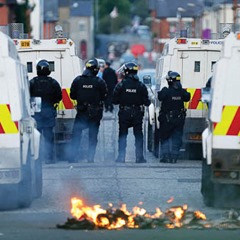Shared future plans
 Peter Cheney analyses and compares the OFMDFM and Alliance Party strategies for improving community relations.
Peter Cheney analyses and compares the OFMDFM and Alliance Party strategies for improving community relations.
A tense, and at times violent, summer has set an uneasy backdrop for the roll-out of OFMDFM’s shared future strategy and the cross-party talks on most contentious issues dividing the main parties.
The strategy and the Alliance Party’s ‘For Everyone’ alternative are both detailed documents and contain significant targets.
As with any policy, they will be judged on the extent to which they are implemented. In this case, the main test is whether they genuinely improve relations (and therefore reduce tensions) between the Protestant and Catholic communities.
Building A United Community
The Executive pledged to draw up a cohesion, sharing and integration strategy in the 2008 Programme for Government. The final version (Together: Building A United Community) was published by DUP and Sinn Féin ministers on 23 May 2013. It has not yet been fully endorsed by the UUP, SDLP and Alliance. The strategy followed pressure from the British, Irish and US governments during the flag protests. ‘Together: Building A United Community’ has four priorities:
1. children and young people;
2. a shared community;
3. a safe community; and
4. cultural expression.
Progress is expected over the course of this Assembly term (which ends in May 2016) but very few target dates are set out. Legislation would be needed to merge the Equality Commission and the Community Relations Council into a new ‘equality and good relations commission’.
Commitments for children and young people include 10,000 placements in the proposed United Youth programme, 100 cross-community summer school or summer camp projects (starting in summer 2015) and 10 shared educational campuses.
The United Youth placements would last for one year and participants would receive a financial allowance. It would initially be open to 16-24 year olds who have been outside education, employment or training for a time (which has not yet been specified by ministers).
The shared campuses will be based on the Lisanelly model; sites have not yet been named. A ‘buddy scheme’ will be rolled out in all publicly funded nursery and primary schools i.e. pairing a child from one section of the community with a child from a different community or ethnic background. Youth intervention work will be extended to cover the full year and will include a new sports programme for interface areas.
On a “shared community”, OFMDFM defines shared spaces as those which are open “on the basis of equality of opportunity” to all sections of society. Different social groups should use these spaces “without denying the ability of others to do likewise.”
A 10-year programme to reduce and remove interface barriers is envisaged. The Department of Justice has reduced the number of barriers from 59 to 54 since 2011. Removal must be “sensitive to the views and perceptions of residents” and barriers “will only be reduced and removed with local agreement and support.”
The Alliance Party has said that the complete removal of peace walls cannot be achieved without agreement on flags, parades and the past.
All future policy and spending commitments should be screened “to determine whether they promote sharing, further entrench division or are essentially neutral.” However, this should happen through the equality impact assessment process rather than a “separate and potentially duplicating piece of work”. This is an apparent rejection of Alliance’s shared future proofing tool.
Four “urban villages” will be established, to regenerate particularly deprived areas. Each one would have a “community space” which both main communities should be able to use. The locations have not been announced but the Newtownards Road in East Belfast has been earmarked as a potential site.
The Executive also intends to establish 10 new shared neighbourhood schemes (45 have been set up since 2006). A review of shared housing is also pledged, reflecting an Alliance Party commitment.
No timescale is set out in the document but Alliance wants to see this completed in 2014.
Aims for a “safe community” include increased reporting of hate crime and the work of the Unite Against Hate campaign is commended. The section also contains a commitment to remove “imagery and displays of cultural expression where these are motivated by a desire to intimidate.” The strategy acknowledges that flags and symbols can be used “to cause intimidation, or to glorify violence, hate or prejudice”.
Policy on parades, flags and the past will be covered by the talks chaired by US diplomat Richard Haass this autumn (see page 18). Ongoing “cultural expression” work includes joint cultural events funded through local government and Arts Council good relations programmes.
The decade of centenaries should involve “responsible remembrance” which encourages people to discuss the past and learn from other traditions.
For Everyone
The Alliance Party published its ‘For Everyone’ blueprint for a shared future
on 29 January after six months of preparation. It covers six themes:
1. the economics of a shared future;
2. children and young people;
3. a shared approach to education;
4. shared spaces;
5. a shared culture; and
6. dealing with the past.
The 2007 Deloitte report (commissioned by OFMDFM) estimated the cost of division to be £1.5 billion per annum. The figure is accepted by Alliance but contested by other parties as some of these costs are necessary for ensuring continued stability e.g. public order policing. The party recommends that all departments accept the shared future policy proofing tool to ensure that all new facilities are genuinely open to everyone.
Alliance wants the early years strategy to include specific commitments on tolerance and inclusion. The Department of Education’s Community Relations, Equality and Diversity policy “narrowly” focuses on the curriculum. Cross-community work needs to continue outside school hours and draw on the work done by well-established voluntary groups e.g. Spirit of Enniskillen and Youth Initiatives.
A “menu of options” for encouraging more mixing in education could include integrated schools, federations of schools, shared campuses and shared faith schools.
Contrary to some media reports, Alliance is not calling for the abolition of the Catholic maintained sector. It accepts that a mixture of education sectors will continue “for the foreseeable future” and hopes that these will increasingly collaborate and develop into a “shared and integrated” system.
As a rule, all future new build schools would be integrated. By 2020, the party wants to see 20 per cent of children educated in integrated schools and 40 per cent educated in mixed schools of all types.
In 2012-2013, around 10 per cent of schoolchildren either attended integrated schools (a 6.6 per cent share) or crossed traditional barriers in other ways
e.g. Catholics attending controlled schools or Protestants attending Catholic maintained schools.
The shared spaces section is the largest part of Alliance’s blueprint. Shared space does not mean “sanitised” neutral space but instead should allow all identities to be expressed peacefully.
Removing interfaces depends on reducing the fear of attack among local residents e.g. through swift policing responses and better urban design. Two targets are set out: a 20 per cent reduction in the number of interfaces by 2023 and a 30 per cent reduction by 2028.
The party re-affirms its policy of flying the union flag over public and civic buildings on designated days. It calls for a common policy for flag-flying to be agreed before the formation of the new councils in April 2015.
Importantly, the party demands zero tolerance of paramilitary symbols: “There must be no place in any normal society for the celebration of a culture of violence and intimidation.”
Alliance calls on the police, Roads Service and Housing Executive to consistently enforce the law in this area It wants to give public sector staff a clear legal basis for removing illegal flags.
As for legal flag-flying, the party proposes that people should place a deposit which would be returned if the flag is voluntarily removed. People should be allowed to display any legal flag from their own residence (including Housing Executive properties) but not from lamp posts as these are entirely public property.
The 2009 Eames-Bradley report is viewed as the best basis for discussing the legacy of the past. Historical case reviews should continue and the Executive should work towards a collective memorial to commemorate the Troubles.
Shared future policy is overseen by the Good Relations Division in OFMDFM. All interested groups wishing to discuss ‘For Everyone’ are encouraged to contact Alliance’s party headquarters or its Stormont office.
Other proposals
Proposals from the other Stormont parties will also be on the table during the Haass talks and subsequent Assembly debates.
The SDLP wants to develop mixed housing estates and introduce tougher laws on outlawing incitement to hatred, paramilitary bands, sectarian chanting at football matches, and the flying of sectarian or national flags on public property.
The Ulster Unionists support a single, shared education system, more mixed tenure housing and more confidence in Ulster-Scots and general British culture.
Progress on community relations policy has traditionally been faster and more substantial under direct rule. The 1977 and 1989 Education Orders, the Community Relations Council and the 2005 Shared Future policy all resulted from policy moves at Westminster.
 In a frank assessment, the latter policy said that Northern Ireland’s underlying problem was “a culture of intolerance” and each citizen needed to recognise a “common humanity” in society rather than “engaging in a perpetual and sterile battle for ethnic power”.
In a frank assessment, the latter policy said that Northern Ireland’s underlying problem was “a culture of intolerance” and each citizen needed to recognise a “common humanity” in society rather than “engaging in a perpetual and sterile battle for ethnic power”.
Ultimately, the success of the Executive’s policy will be measured against its own commitments and also the progress that was made under direct rule. After a long delay, this is Stormont’s opportunity to prove its commitment to a shared future.
Cross-party talks
While the talks to be chaired by Richard Haass (pictured) have been described as all-party, they will only comprise the five parties in the Executive. The vice-chair will be Meghan O’Sullivan, a Harvard professor of international affairs, and each Executive party will nominate two representatives.
This panel will seek “views and evidence” from “interested stakeholders” e.g. the four other Assembly parties, loyalist groupings and civil society. Discussions will start in mid-September. The panel is expected to produce draft recommendations by early December and a final report by the end of the year.





